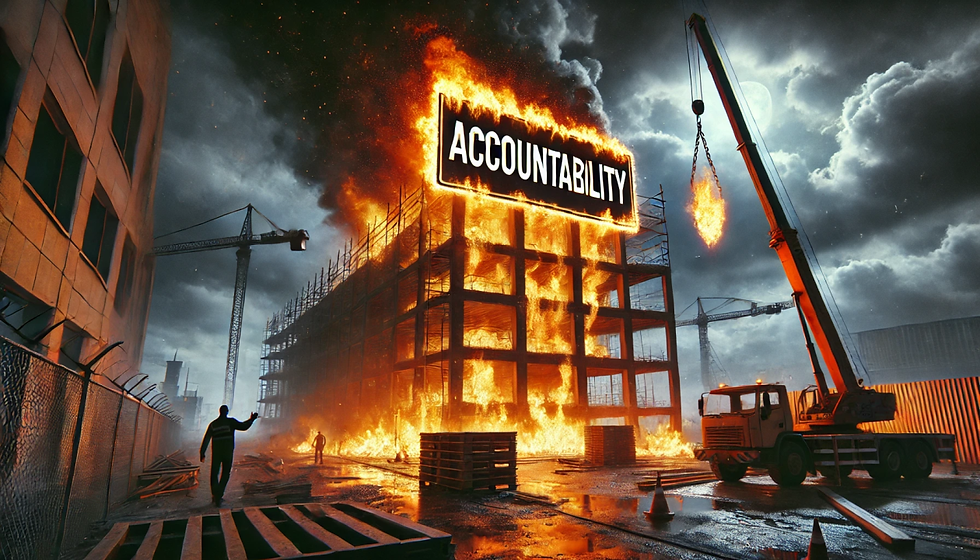The Death of Accountability in Construction: Why Nobody Wants to Take Responsibility Anymore
- Steve G
- Jan 11, 2025
- 3 min read

Accountability is the backbone of any successful construction project. It’s what ensures that deadlines are met, budgets are respected, and quality is maintained. But somewhere along the way, accountability has been pushed aside. In its place, we see blame-shifting, excuses, and a refusal to take ownership of mistakes.
The question we must ask is simple: Why is nobody taking responsibility anymore?
The Blame Culture is Destroying Us
Construction projects are inherently complex, involving multiple stakeholders—clients, contractors, project managers, suppliers, and workers. However, instead of fostering collaboration, this complexity often breeds conflict. When delays occur or budgets spiral out of control, the default reaction is to point fingers.
The phenomenon of “blame culture” has been extensively studied in organizational management. Research suggests that environments where blame dominates are characterized by low morale, lack of trust, and reduced innovation (Edmondson, 1999). In my experience, I’ve seen this play out repeatedly in the construction industry, where mistakes are met not with solutions but scapegoating.
The Rise of Plausible Deniability
The legal and contractual frameworks governing construction have become so convoluted that many stakeholders now rely on them to avoid accountability. A contractor might argue, “That’s not in my scope,” while a client might claim, “The plans were unclear.” Everyone hides behind fine print, and nobody steps up to take ownership of the problem.
In my PhD research on project management, I found that the over-reliance on contracts as a shield is one of the key factors eroding trust in construction (Gardner, 2024). Contracts are essential, but when they become tools to deflect responsibility rather than outline it, they undermine the very collaboration they are meant to foster.
The Consequences of No Accountability
The impact of this accountability crisis is staggering:
Project Failures: Studies show that over 70% of large construction projects face delays or cost overruns, and lack of accountability is often a major contributing factor (Flyvbjerg et al., 2003).
Declining Morale: Workers and managers alike feel demoralized when there’s no clear direction or ownership of mistakes. This leads to high turnover and burnout—issues that plague our industry.
Client Distrust: When no one owns up to mistakes, clients lose faith in the team managing their investment. This damages reputations and future opportunities for all involved.
How Did We Get Here?
The root causes of this accountability crisis are multifaceted:
Fragmented Responsibility: The sheer number of stakeholders on a project creates silos, with each party focused only on their narrow scope.
Fear of Repercussions: In a highly competitive and litigious industry, admitting fault can feel like career suicide.
Lack of Leadership: When project managers fail to model accountability, it trickles down to every level of the project team (Gardner, 2024).
Who Will Step Up?
Fixing the accountability problem isn’t just about pointing out flaws—it’s about proposing solutions. Here’s what needs to change:
Leadership Must Lead: Accountability starts at the top. Leaders who own their mistakes inspire their teams to do the same.
Simplify Contracts: Contracts should define responsibilities clearly without creating loopholes for blame-shifting.
Embrace a No-Blame Culture: Adopt practices where mistakes are treated as learning opportunities rather than grounds for punishment.
Foster Communication: Clear, consistent communication across all stakeholders reduces the ambiguity that often leads to conflict.
A Call to Action
This crisis is not someone else’s problem. It’s our problem. Every stakeholder in the construction industry—whether you’re a project manager, contractor, supplier, or client—has a role to play in rebuilding a culture of accountability.
So, I ask you: Are you part of the problem, or part of the solution? Let’s stop hiding behind contracts and excuses. Let’s lead by example, own our mistakes, and start building trust alongside our structures.
Author Bio: Dr. Stephen Gardner, PhD, is a seasoned Senior Project Manager with over 20 years of experience in the Australian construction industry. His PhD research focuses on the technical and interpersonal skills of successful construction project managers, including the role of accountability in driving project outcomes. Stephen is passionate about fostering collaboration, trust, and innovation to create a more sustainable construction industry.
Hashtags: #ConstructionLeadership #AccountabilityCrisis #FutureOfConstruction #BlameCulture #LeadershipMatters #ConstructionIndustry #ProjectManagement
References:
Gardner, S. (2024). Technical and interpersonal skills and characteristics of successful construction project managers. Griffith University.
Edmondson, A. (1999). "Psychological Safety and Learning Behavior in Work Teams." Administrative Science Quarterly.
Flyvbjerg, B., Holm, M. K. S., & Buhl, S. L. (2003). "How Common and How Large Are Cost Overruns in Transport Infrastructure Projects?" Transport Reviews.



Comments